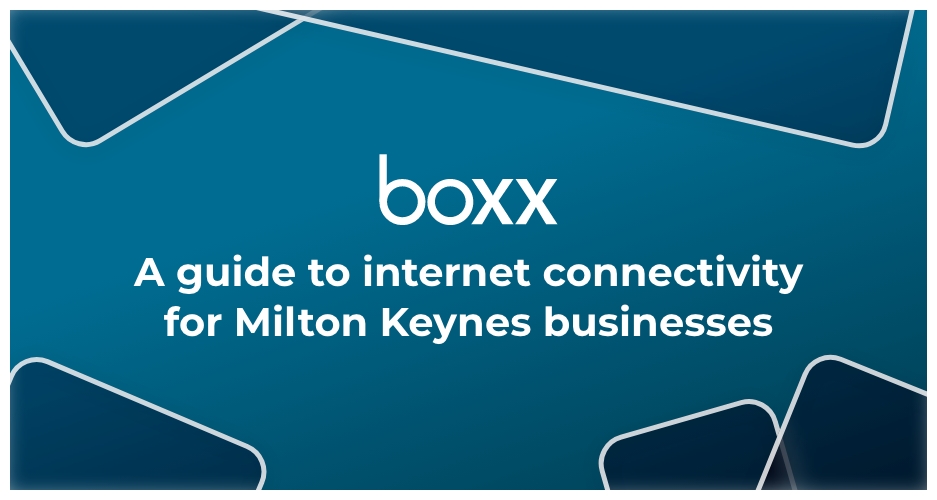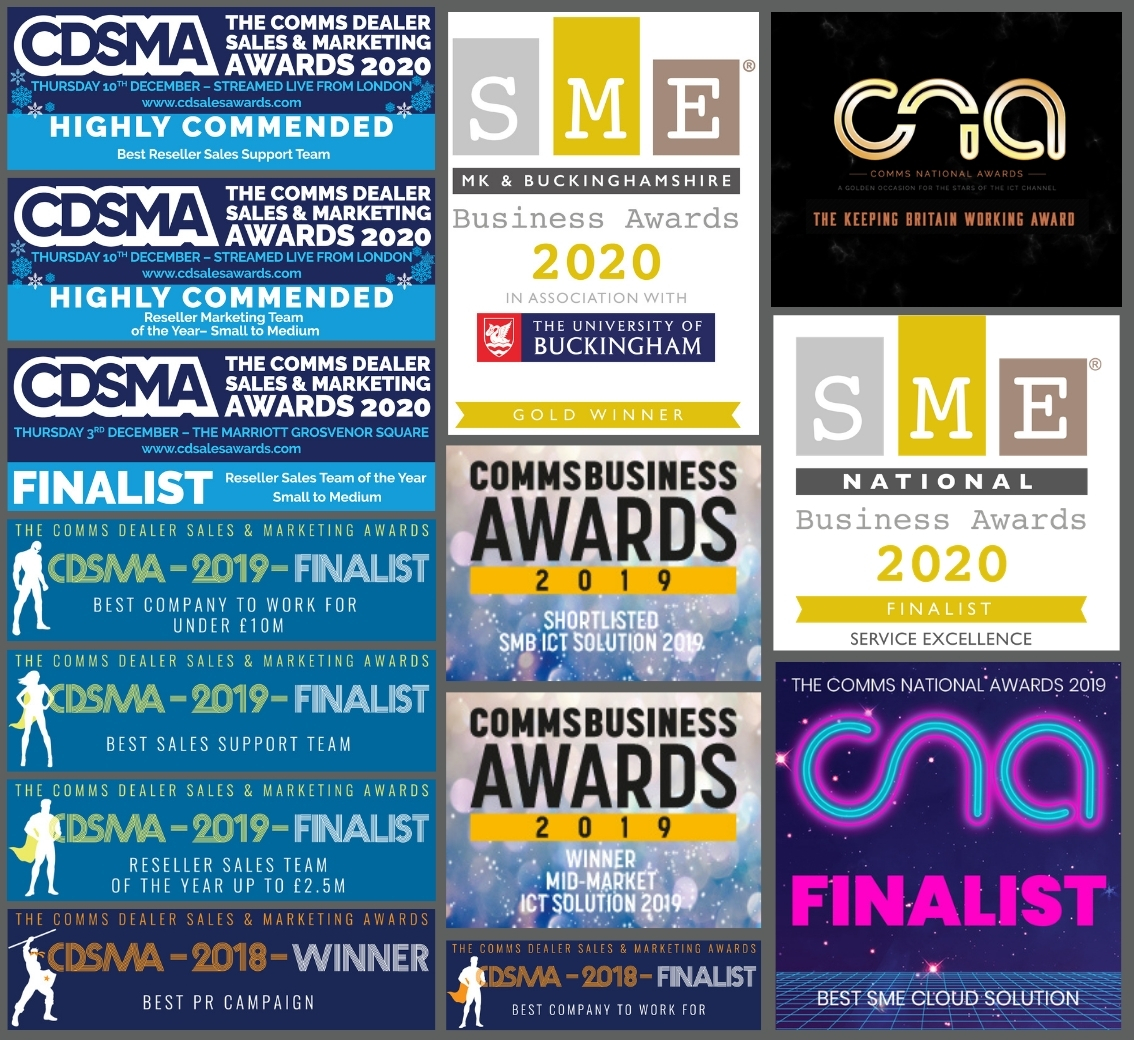
Milton Keynes is home to an amazing diversity of businesses. And whatever their sector and size, they all need a strong internet connection. We love helping businesses across Milton Keynes find the perfect connectivity solution for their individual needs.
The challenge is figuring out what type of connection is best. There’s such an array of choice and providers that it can start to get overwhelming.
Full-fibre broadband connections like FTTP are widely available in Milton Keynes now. But is that actually right for your business? There’s a lot to consider, and that’s where we can help. Boxx Communications are proud to be a Milton Keynes business, and we support other businesses throughout the city.
We know the options, and we know how to tailor them to you. Are you considering changing the way you connect? The first step is knowing what types of connectivity are available. With that in mind, here’s our rundown of some of the most popular internet solutions, and how we’ve successfully onboarded multiple Milton Keynes businesses to these connections.
1. Leased lines
We’re starting with a premium option. A leased line is an Ethernet connection that goes straight to your premises. Unlike broadband connections, leased lines are uncontended.
What that means is that you’re not sharing bandwidth with anyone else. It’s your own private connection. That means guaranteed speeds and higher security. You can get speeds of up to 10Gbps. And yes, they’re available in Milton Keynes!
Who are leased lines for? The obvious answer is larger businesses. If you have a large number of users connected to the internet at any one time, you need to make sure you have enough bandwidth for them. Otherwise, everything you do online will be slowed down.
It’s not just big businesses though. For instance, leased lines are great for anyone who regularly uploads and downloads very large files. Let’s say you’re a video production company. Chances are you’re regularly transferring huge files. This will be a lot quicker on a leased line.
They’re also good for shared office spaces, where you need to provide a reliable connection to lots of different businesses and freelancers.
However, leased lines are generally more expensive than most other options. You need to be sure that you need all those benefits to justify the price. Want to learn more? We delve into the pros and cons of leased lines here.
2. Ethernet Flex
Here’s a scenario. Mostly, your internet usage is pretty stable. But sometimes, your need for speed and bandwidth suddenly shoots up. This is a common issue, and it poses a dilemma.
Option one is to go for a connection that meets your normal needs. Then in those busier times, your bandwidth is choked and it slows down for everyone. Option two is to get a connection that covers the busier times. The trouble here is that most of the time, you’re overpaying.
That’s where Ethernet Flex comes in. It’s a standard connection with the capability to boost your internet speed, on the fly, from 200Mbps to 1Gbps. It’s completely automatic. Whenever you need it, it kicks in – with no need to request it, and no extra charge.
For those needing a flexible approach, Ethernet Flex could be your knight in shining armour. Here at Boxx, we monitor the performance of the speeds to ensure you’re receiving the necessary boost when you need it.
If you want to see this broadband type in action, check out our case study on how we provided Ethernet Flex to Fossil Watches in Milton Keynes.
3. FTTP
FTTP stand for fibre to the premises. This is a form of full fibre broadband. That means it’s fibre-optic cables all the way: from the exchange, via the green cabinet, to your premises.
Unlike leased lines, it’s a contended connection. That means it’s shared with other users, so speeds aren’t guaranteed and can reduce during busy periods. Still, it’s a great way to connect. Speeds can reach 1Gbps, which is more than enough for many businesses.
That’s thanks to the fibre cables. Fibre carries data much faster than the copper PSTN wires that make up the UK’s legacy infrastructure. In addition, that PSTN infrastructure is being phased out across the country. By 2025, it should all be gone.
Since FTTP doesn’t rely on PSTN, it’s futureproof too. It’s also available in many parts of Milton Keynes. Three networks are providing it in total, and they each have different levels of coverage across the city.
Here at Boxx, we can provide FTTP via all of them. That means we can offer more coverage at the fairest price. If you’re a Milton Keynes business looking for full-fibre broadband, get in touch!
4. SoGEA
Another full-fibre option is SoGEA (Single Order Generic Ethernet Access). SoGEA is a service that provides broadband connectivity without the phone line.
In case you’re wondering, you can still make calls. You’d just be routing them online. If you already have a VoIP phone system, you’re doing this already! The lack of a phone line is a real benefit, because it reduces the cost and complexity of installation.
SoGEA is really a replacement for FTTC, which we’ll be discussing next. Unlike FTTC, it doesn’t require PSTN wires. That makes it futureproof, and it also tends to offer better speeds and bandwidth than FTTC.
It’s less expensive than the options we’ve discussed so far as well. This makes it a great option for smaller business that don’t need the performance levels offered by leased lines or FTTP.
5. FTTC
FTTC (fibre to the cabinet) uses a mix of fibre and copper cables. It’s fibre from the exchange to the green cabinet, and then copper from there to your premises.
There are upsides and downsides here. FTTC is great for less data-hungry businesses, and the presence of fibre makes it much faster than an all copper connection. It’s also widely available, with good coverage across Milton Keynes.
But, like we’ve mentioned, those copper cables will be decommissioned by 2025. That means it isn’t futureproof. On top of that, it’s more prone to slow-downs than FTTP. They’re both contended connections, but that makes a bigger difference with FTTC due to the copper cables. Speeds can slow down at busy times of day.
6. ADSL
ADSL (Asymmetric Digital Subscriber Line) is full copper broadband and is the predecessor to fibre broadband. It was a game-changer when it launched back in 2000 – just ask anyone who remembers dial-up!
However, technology moves on. ADSL is all copper, which means it’s being phased out. It’s still available for now, and it will enable you to do the basics like browsing the internet and managing emails.
Still, most businesses in Milton Keynes need a lot more out of the internet than that. We’re in the age of cloud services, video calls and the internet of things. ADSL just isn’t built for it.
We’ve helped countless Milton Keynes businesses transition to a more future-proof connectivity solution. If you’re feeling overwhelmed by the options, we’re here to make it easy. Contact us here.
Final thoughts
Working out what connectivity solution is right for you means asking what the needs of your business are, and how these might scale over time. That’s something we can help answer.
We’re proud to be based in Milton Keynes, helping businesses in our community to thrive in a digital age. But not only do we have the expertise to help – we are also not tied to any one network. One call to us, and we can quote for any service available to you in your area. This means more coverage across multiple postcodes.
Contact us now to get expert advice and help with deciding the best solution for your connectivity needs.





